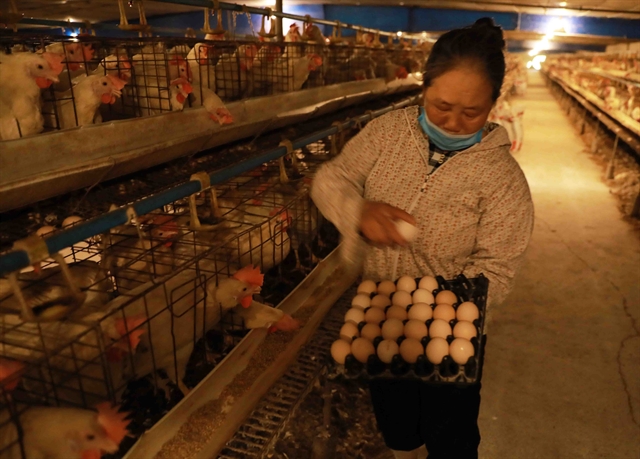 Economy
Economy


|
| A farmer collects eggs at a farm in Chương Mỹ District, Hà Nội. The poultry farming sector is seking support to overcome difficulties. — VNA/VNS Photo Vũ Sinh |
HÀ NỘI — Việt Nam Poultry Association (VIPA) has submitted a petition to Government calling for solutions to remove difficulties for the poultry farming and save farmers and enterprises from bankruptcy.
The association said that many enterprises and farms were on the verge of collapse with thousands forced to narrow down production scale or temporarily halt operation due to prolonged losses.
Due to the negative impact of the COVID-19 pandemic, the cost of input materials increased to a record high while the consumption market fluctuated, pushing the prices of useful poultry products down considerably.
At some point in time, the selling prices of poultry products stayed at only two-thirds of the production costs, pushing the poultry farming industry into a lot of difficulties, the association said.
VIPA said to rescue the domestic poultry farming industry, it was necessary to tighten the management of the imports of poultry products.
The illegal transportation and trade of poultry and poultry products across the border into Việt Nam continued to be complicated in localities sharing the borders with other countries, especially in the central and southern regions.
The association estimated that on average, dozens of thousands of discarded egg-laying hens are smuggled into Việt Nam each month, which not only increased the risk of disease infection but also seriously affected the domestic poultry industry.
VAPI proposed the Government create non-tariff measures to limit the import of poultry products.
It urged the Government to promptly ban the import of meat products from countries which had not banned the use of animal feed additives Ractopamine and Cysteamine and to tighten the import of by-products to protect consumers. From 2014, Ractopamine and Cysteamin were banded from 160 countries around the world, including Việt Nam.
Statistics from the General Department of Customs showed that the import of chickens increased during the past five years and accounted for 20-25 per cent of the total consumption of chicken meat in the domestic market.
It was necessary to reduce some quarantine fees and remove unnecessary administrative procedures to lower production costs, the association said, adding that the quarantine fee should be reduced by half.
Việt Nam would also need a programme to promote the export of poultry products and policies to encourage investment in poultry farming and processing.
As foreign – invested firms were being provided with many incentives, VAPI called for similar policies to support domestic enterprises and farmers to enhance the competitiveness and be able to compete with foreign-invested companies.
A fair and healthy business environment was important to promote the sustainable development of the poultry industry, the association said.
The association urged the Ministry of Industry and Trade and the Ministry of Finance to enhance market supervision to prevent the dumping of husbandry products as unhealthy competition.
Reducing costs
Bùi Đức Huyên, Director of Việt Tín Nutrition Joint Stock Company said that lowering animal feed was critical to lower production cost of the husbandry industry.
The Government should pay attention to developing a planning of raw materials for livestock and poultry farming, especially maize.
Communication should be enhanced to encourage consumers to use healthy products and limit the import of meat, together with policies to promote the establishment of value chains for the farming industry, he said.
Sharing the same viewpoint, deputy director general of CP Việt Nam Livestock Joint Stock Company Vũ Anh Tuấn, said that as animal feed accounted for a major part in the production cost of the husbandry industry, it was necessary to develop a project on rice planting specialised for the production of animal feed.
The focus must also be placed on expanding the export markets for husbandry products and providing supports to enterprises to improve production to meet the quality requirements of the World Organisation for Animal Health.
Negotiations should be continued to sign veterinary agreements with countries and territories which had high demand for poultry products such as Singapore, Malaysia, Bangladesh and Myanmar.
Under the strategy on animal husbandry development for 2021-30 period with a vision to 2045, Việt Nam aims to maintain about 500-550 million chickens with egg production at around 23 billion and poultry meet accounting for 29-31 per cent of the total meat of all kinds.
Deputy Minister of Agriculture and Rural Development Phùng Đức Tiến said that it’s time to implement solutions to reduce productions costs through the development of raw materials areas for animal feed.
At the same time, the imports of poultry products must also be tightened, Tiến said, adding that the domestic poultry farming should also create products with competitiveness to gain the market. — VNS




